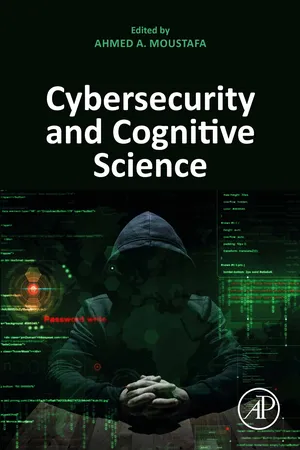
- 400 pages
- English
- ePUB (mobile friendly)
- Available on iOS & Android
eBook - ePub
Cybersecurity and Cognitive Science
About this book
Cybersecurity and Cognitive Science provides the reader with multiple examples of interactions between cybersecurity, psychology and neuroscience. Specifically, reviewing current research on cognitive skills of network security agents (e.g., situational awareness) as well as individual differences in cognitive measures (e.g., risk taking, impulsivity, procrastination, among others) underlying cybersecurity attacks. Chapters on detection of network attacks as well as detection of cognitive engineering attacks are also included. This book also outlines various modeling frameworks, including agent-based modeling, network modeling, as well as cognitive modeling methods to both understand and improve cybersecurity.
- Outlines cognitive modeling within cybersecurity problems
- Reviews the connection between intrusion detection systems and human psychology
- Discusses various cognitive strategies for enhancing cybersecurity
- Summarizes the cognitive skills of efficient network security agents, including the role of situational awareness
Tools to learn more effectively

Saving Books

Keyword Search

Annotating Text

Listen to it instead
Information
Table of contents
- Cover
- Front Matter
- Table of Contents
- Copyright
- Contributors
- List of Illustrations
- List of Tables
- Chapter 1 : Social engineering attacks and defenses in the physical world vs. cyberspace: A contrast study
- Chapter 2 : A dual integrated dynamic intrusion detection system (DID-IDS) for protection against network and social engineering attacks
- Chapter 3 : Working from home users at risk of COVID-19 ransomware attacks
- Chapter 4 : Individual differences in cyber security behavior using personality-based models to predict susceptibility to sextortion attacks
- Chapter 5 : Deconstructing security and privacy issues: The development of a logic for capturing mismorphisms*
- Chapter 6 : Are you anonymous? Social-psychological processes of hacking groups
- Chapter 7 : On the relation between hacking and autism or autistic traits: A systematic review of the scientific evidence
- Chapter 8 : An introduction to cyberbullying
- Chapter 9 : The impact of cyberbullying across the lifespan
- Chapter 10 : Cyber situational awareness issues and challenges
- Chapter 11 : Development and application of the Information Security Core Human Error Causes (IS-CHEC) technique
- Chapter 12 : Machine learning for the security of healthcare systems based on Internet of Things and edge computing*
- Chapter 13 : Lying trolls: Detecting deception and text-based disinformation using machine learning
- Chapter 14 : Modeling the effects of network size in a deception game involving honeypots
- Chapter 15 : Computational modeling of decisions in cyber-security games in the presence or absence of interdependence information
- Index
- A
Frequently asked questions
Yes, you can cancel anytime from the Subscription tab in your account settings on the Perlego website. Your subscription will stay active until the end of your current billing period. Learn how to cancel your subscription
No, books cannot be downloaded as external files, such as PDFs, for use outside of Perlego. However, you can download books within the Perlego app for offline reading on mobile or tablet. Learn how to download books offline
Perlego offers two plans: Essential and Complete
- Essential is ideal for learners and professionals who enjoy exploring a wide range of subjects. Access the Essential Library with 800,000+ trusted titles and best-sellers across business, personal growth, and the humanities. Includes unlimited reading time and Standard Read Aloud voice.
- Complete: Perfect for advanced learners and researchers needing full, unrestricted access. Unlock 1.4M+ books across hundreds of subjects, including academic and specialized titles. The Complete Plan also includes advanced features like Premium Read Aloud and Research Assistant.
We are an online textbook subscription service, where you can get access to an entire online library for less than the price of a single book per month. With over 1 million books across 990+ topics, we’ve got you covered! Learn about our mission
Look out for the read-aloud symbol on your next book to see if you can listen to it. The read-aloud tool reads text aloud for you, highlighting the text as it is being read. You can pause it, speed it up and slow it down. Learn more about Read Aloud
Yes! You can use the Perlego app on both iOS and Android devices to read anytime, anywhere — even offline. Perfect for commutes or when you’re on the go.
Please note we cannot support devices running on iOS 13 and Android 7 or earlier. Learn more about using the app
Please note we cannot support devices running on iOS 13 and Android 7 or earlier. Learn more about using the app
Yes, you can access Cybersecurity and Cognitive Science by Ahmed Moustafa in PDF and/or ePUB format, as well as other popular books in Psychology & Educational Psychology. We have over one million books available in our catalogue for you to explore.